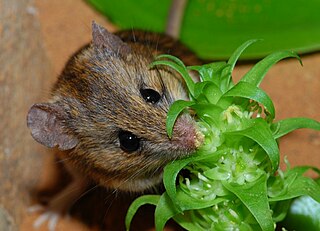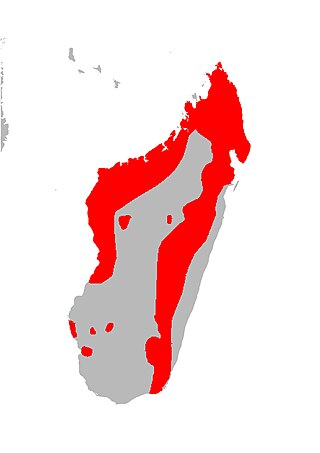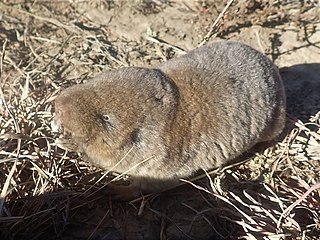
Eutheria, also called Pan-Placentalia, is the clade consisting of placentals and all therian mammals that are more closely related to placentals than to marsupials.

Xanthocyparis is a genus of cypresses in the family Cupressaceae. As of August 2021, it has only one species, Xanthocyparis vietnamensis, native to Vietnam and southeast China. It is commonly known as the Vietnamese golden cypress. The Nootka cypress, Cupressus nootkatensis or Callitropsis nootkatensis, was also placed in the genus, but this has been rejected.

The blesmols, also known as mole-rats, or African mole-rats, are burrowing rodents of the family Bathyergidae. They represent a distinct evolution of a subterranean life among rodents much like the pocket gophers of North America, the tuco-tucos in South America, and the Spalacidae from Eurasia.

Plethodontohyla is a genus of microhylid frogs endemic to Madagascar.

Aethomys is a genus of rodent from Africa. They are commonly referred to as rock rats, bush rats or rock mice.

The Damaraland mole-rat, Damara mole rat or Damaraland blesmol, is a burrowing rodent found in southern Africa. Along with the smaller, less hairy, naked mole rat, it is a species of eusocial mammal.

The Palaeonisciformes, commonly known as "palaeoniscoids" are an extinct grouping of primitive ray-finned fish (Actinopterygii), spanning from the Silurian/Devonian to the Cretaceous. They are generally considered paraphyletic, but their exact relationships to living ray-finned fish are uncertain. While some and perhaps most palaeoniscoids likely belong to the stem-group of Actinopteryii, it has been suggested that some may belong to the crown group, with some of these possibly related to Cladistia and/or Chondrostei. Many palaeoniscoids share a conservative body shape and a similar arrangement of skull bones, though paleoniscoids as a whole exhibit considerable diversity in body shape.

Microgale is a genus of mammal in the family Tenrecidae. There are 21 living species on the island of Madagascar and one extinct species known from a fossil. Some species have been discovered in the last twenty years.

Ansell's mole-rat is a species of rodent in the family Bathyergidae. It is endemic to Zambia. Its natural habitats are moist savanna and miombo forests. It is noted for its very long tunnels, up to 2.8 km (1.7 mi) for a single colony of only ten individuals. The colonies are made of a eusocial system. They include a main reproductive king and queen that are thought to be faithful to one another.
The Nigerian mole-rat is a species of rodent in the family Bathyergidae. It is found in northern Nigeria and Cameroon. A colonial, subterranean species, its natural habitats are tropical dry lowland grassland, riverside woodland and rocky places.

Herpestes is a genus within the mongoose family Herpestidae. Several species in the family are known as slender mongooses. It is the type genus of the family, and comprises 5-6 living species, each with several subspecies. Fossil remains of three prehistoric species were excavated in France, and described in 1853.
The Zambian mole-rat is a species of rodent in the family Bathyergidae. It is found in Zambia and the Democratic Republic of the Congo. It was formerly considered a subspecies of Cryptomys hottentotus.

The Viverrinae represent the largest subfamily of the Viverridae comprising three genera, which are subdivided into six species native to Africa and Southeast Asia. This subfamily was denominated and first described by John Edward Gray in 1864.

Laephotis is a genus of bats in the family Vespertilionidae. Species within this genus are:

The common mole-rat, African mole-rat, or Hottentot mole-rat, is a burrowing rodent found in Southern Africa, in particular in the Western Cape province of South Africa. It also occurs in Eswatini, Lesotho, Malawi, Mozambique, Tanzania, Zambia, and Zimbabwe. It is a species in the subfamily Bathyerginae.
Chodsigoa is a genus of shrews in the tribe Nectogalini.

Fukomys is a genus described in 2006 of common mole-rats, containing several species that were formerly placed in the genus Cryptomys; its species are endemic to Africa. The species contained in the genus includes :

The Corsican hare, also known as the Apennine hare or Italian hare, is a species of hare found in Southern Italy, Central Italy, and Corsica.

Novakiella is a genus of South Pacific orb-weaver spiders. Previously monotypic containing the single species, Novakiella trituberculosa found in Australia and New Zealand, a second species was recognised in 2021, Novakiella boletus.






























